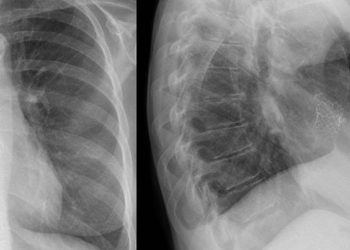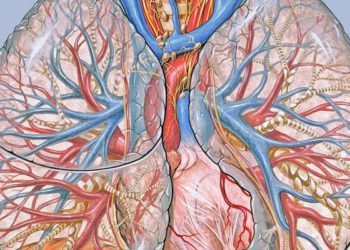Clinically-integrated e-learning course improves evidence-based practice in ObGyn trainees in low- and middle-income countries
Image: CC/Travis
Study author and Editor-in-Chief of the British Journal of Obstetrics and Gynecology (BJOG), Professor Khalid Khan, MBBS, MSc, talks to 2 Minute Medicine: Women’s Health Research Unit, Barts and The London School of Medicine and Dentistry, London, United Kingdom.
 “Workplace-based e-learning of evidence-based medicine can change practice. The significant results confirm that this mode of teaching is better than traditional teaching. E-learning is effective but is also likely to be cost effective.”
“Workplace-based e-learning of evidence-based medicine can change practice. The significant results confirm that this mode of teaching is better than traditional teaching. E-learning is effective but is also likely to be cost effective.”
Key study points:
- Obstetrics and gynecology (ObGyn) trainees in low- and middle-income countries who completed a clinically integrated e-learning course on evidence-based medicine performed better on knowledge and skills tests than trainees who completed a self-directed course.
- E-learning trainees reported improvements on two measures of how evidence-based practice was incorporated into the educational environment.
Primer: Evidence-based medicine (EBM), a term used to describe up-to-date standards of care, has gained increasing prominence as health systems across the world seek to improve outcomes. EBM is a systematic process of reviewing, evaluating, and integrating scientifically tested evidence into clinical practice. Groups such as the Cochrane Collaboration synthesize and disseminate EBM results to clinicians, policymakers, and patients (1).
Despite the overwhelmingly accepted value of evidence-based practice, there is no consensus on the best way to incorporate EBM into medical education and training. EBM program directors have cited a lack of time, funding, and trained, interested faculty as barriers to implementing an effective curriculum (2). Experts worry that current medical and surgical training programs do not adequately equip trainees with the ability to manage information in real-time as is required in an evidence-based practice (3).
These challenges have been noted in well-resourced hospitals in high-income countries; unsurprisingly, these difficulties are magnified in under-resourced hospitals in low- and middle-income countries (LMICs). FewFew clinicians in LMICs are trained in applying EBM (4), let alone prepared to teach these techniques to trainees in multiple medical schools and across different countries. Lack of access to educational technologies and lack of LMIC-relevant evidence compound difficulties.
The present study examined the effectiveness of using a clinically integrated e-learning reproductive health course to teach EBM skills and knowledge to ObGyn trainees in LMICs.
Background reading:
- The Cochrane Collaboration
- A survey to determine the prevalence and characteristics of training in Evidence-Based Medicine in emergency medicine residency programs
- Teaching evidence-based medicine: Should we be teaching information management instead?
- The International Clinical Epidemiology Network (INCLEN): a progress report
This [randomized] trial: assigned trainees in 60 clusters across Argentina, Brazil, Democratic Republic of the Congo, India, Philippines, South Africa, and Thailand to either a clinically integrated e-learning course (123 participants) or a traditional self-directed course (81 participants).
Compared to self-directed course participants, e-learning course participants had greater knowledge (adjusted mean difference of 8%, p<0.001) and skills (adjusted mean difference of 5%, p=0.02). Additionally, e-learning participants self-reported improvements on two educational environment measures developed and validated to assess how the clinical environment facilitates EBM in practice: general relationships and support (e.g. interaction with junior and senior staff; p=0.03) and opportunities to apply EBM (e.g. recognizing appropriate patient cases where EBM could be applied; p=0.04).
In sum: ObGyn trainees in LMICs participating in a clinically integrated e-learning EBM course acquired more knowledge and skills and reported a better educational environment than those who participated in traditional EBM learning. Clinical integration of EBM curriculum likely drove the improvement in educational environment, though one limitation of the trial was the inability to separate the respective contributions of e-learning and clinically integrated coursework. Additionally, the effect of the course on actual patient outcomes was not measured.
These findings provide a blueprint for future teaching of EBM that may also be applicable in high-income countries, particularly in resource-poor and non-academic hospitals. Furthermore, this trial corroborates perspectives from EBM program directors, who desired an explicit EBM curriculum, e-training for faculty, and models for integrating EBM principles into practice (2).
Click to read the study in JAMA
Click to read an accompanying editorial in JAMA
By [CH] and [LH]
More from this author: Patients who utilize online health services make greater use of in-person services, Screening mammography linked to overdiagnosis; may have lesser impact on mortality than thought, UK research funding for infectious diseases inconsistent with global burden of disease
© 2012 2minutemedicine.com. All rights reserved. No works may be reproduced without written consent from 2minutemedicine.com. Disclaimer: We present factual information directly from peer reviewed medical journals. No post should be construed as medical advice and is not intended as such by the authors or by 2minutemedicine.com. PLEASE SEE A HEALTHCARE PROVIDER IN YOUR AREA IF YOU SEEK MEDICAL ADVICE OF ANY SORT.



![2 Minute Medicine: Pharma Roundup: Price Hikes, Breakthrough Approvals, Legal Showdowns, Biotech Expansion, and Europe’s Pricing Debate [May 12nd, 2025]](https://www.2minutemedicine.com/wp-content/uploads/2025/05/ChatGPT-Image-May-12-2025-at-10_22_23-AM-350x250.png)

